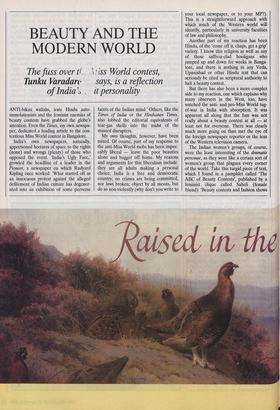BEAUTY AND THE MODERN WORLD
The fuss over ti 1.4 iss World contest, Tunku Varadant says, is a reflection
of India:, , it personality
ANTI-bikini wallahs, irate Hindu auto- immolationists and the feminist enemies of beauty contests have grabbed the globe's attention. Even the Times, my own newspa- per, dedicated a leading article to the con- tentious Miss World contest in Bangalore.
India's own newspapers, naturally, apportioned hectares of space to the rights (none) and wrongs (plenty) of those who opposed the event. 'India's Ugly Face,' growled the headline of a leader in the Pioneer, a newspaper on which Rudyard Kipling once worked: 'What started off as an innocuous protest against the alleged defilement of Indian culture has degener- ated into an exhibition of some perverse facets of the Indian mind.' Others, like the Times of India or the Hindustan Times, also lobbed the editorial equivalents of tear-gas shells into the midst of the massed disrupters.
My own thoughts, however, have been mixed. Of course, part of my response to the anti-Miss World mobs has been impec- cably liberal — leave the poor beauties alone and bugger off home. My reasons and arguments for this liberalism include: they are all adults making a personal choice; India is a free and democratic country; no crimes are being committed, nor laws broken; object by all means, but do so non-violently (why don't you write to your local newspaper, or to your MP?). This is a straightforward approach with which much of the Western world will identify, particularly in university faculties of law and philosophy.
Another part of my reaction has been Hindu, of the 'come off it, chaps, get a grip' variety. I know this religion as well as any of those saffron-clad hooligans who jumped up and down for weeks in Banga- lore, and there is nothing in any Veda, Upanishad or other Hindu text that can seriously be cited as scriptural authority to halt a beauty contest.
But there has also been a more complex side to my reaction, one which explains why many observers in the West, too, have watched the anti- and pro-Miss World tug- of-war in India with absorption. It was apparent all along that the fuss was not really about a beauty contest at all — at least not for everyone. There was clearly much more going on than met the eye of the foreign newspaper reporter or the lens of the Western television camera.
The Indian women's groups, of course, were the least interesting of the dramatis personae, as they were like a certain sort of women's group that plagues every corner of the world. Take this turgid piece of text, which I found in a pamphlet called The ABC of Beauty Contests', published by a feminist clique called Saheli (female friend): 'Beauty contests and fashion shows are an ideological tool for market forces. The forthcoming beauty contest can become a rallying point for progressive forces to jointly challenge the stereotypical and derogatory treatment of women by patriarchal, capitalist trends.' So there is now a global village of radical sisterhood. Women in saris can burn their bras too, and can be just as boring.
The more interesting tussle, however, and one which absolutely enthralled me, I must confess, was fought between the self- appointed 'modernisers' on the one hand and the equally self-appointed 'traditional- ists' on the other. Both were claiming to speak for India and Indians. Both appealed to powerful ideologies and politi- cal currents — the former to 'progress' and 'advancement', the latter to 'tradition' and 'morality'. Wake up and join the world, one group exhorted. Why should we, when our own culture will die in the process? the other group replied.
Beauty contests have long attracted their barrackers (which is why we no longer see them live on British television), but never before have they been treated as a metaphor for the nation's soul. It was fool- ish of the 'political' Hindus to describe the Miss World contest as a threat to 'Indian civilisation' (whatever that may mean), just as it was poppycock on the part of the pro- bikini brigade to regard the contest as a lit- mus test of India's newly acquired 'Police? Will you find him and tell him his supper's ready?'
'modernity'. The first position is as obscu- rantist as the second is arrogant, and both points of view have together conspired to wreck a debate which Indians must con- duct among themselves.
I must declare that my ideal world would have no place either for beauty con- tests or for the ghastly Mrs Julia Morley of Miss World Inc. (Nor, incidentally, would there be any trident-wielding illiterates speaking on my behalf and that of 750 mil- lion otlicr Hindus.) The world must be patriarchal, of course, but measuredly so. Beauty contests ,nay not be a 'process of commodification of women', as some over- heated critics would argue, but they are irredeemably vulgar. And vulgarity is the deadliest foe of the 'progress' for which India strives. As the Bangalore affair showed, a low-grade assertion of 'moderni- ty' will tend to provoke a lurid backlash from Hindu alarmists, endangering the really valuable advances in the process.
In the great battle for India's soul to be f tight over the next decades, literacy and rile survival of the English language will play a greater role than tits and bums and beauty contests. How many people will speak English in 2050? How many people will be able to read anything at all, in any language? Those, frankly, are the vital statistics by which modernity is made or unmade. In the meantime, Miss World 1996 has been crowned and the unruly mobs have dispersed. 'Indian civilisation' has, for the moment, survived this brazen assault on its integrity. There is no sign, either, that the country's men have all turned into pathological rapists. But the feeling remains among intelligent people in the country, and perhaps even the not-so- intelligent, that the great debate on India's 'modernity' has only just begun.
The author writes for the Times.



















































































 Previous page
Previous page